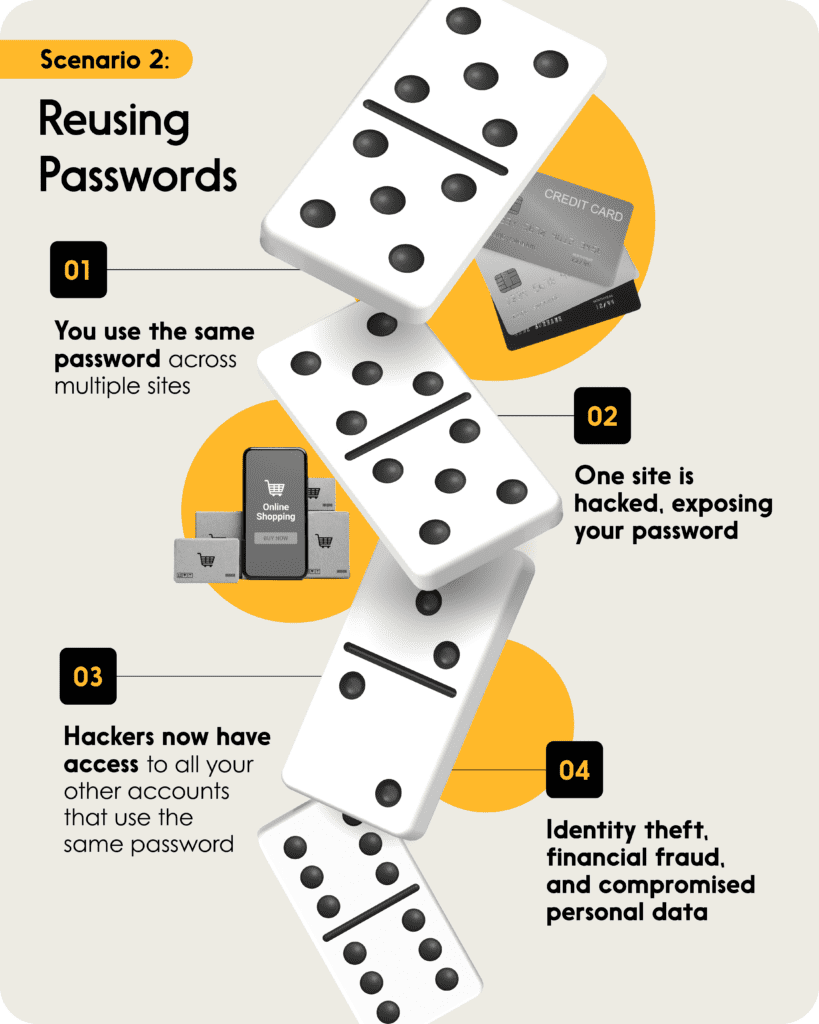If you grew up with digital technologies, you might be easygoing about digital security. Having your devices and accounts hacked? It hardly ever crosses your mind. But are you leaving yourself vulnerable to a major headache?
A data security problem can start with one lapse, like leaving your phone unattended or typing sensitive information while you’re on public WiFi. That one lapse can lead to more issues — like losing control of your social media accounts or having a money transfer intercepted.
It’s like a row of dominoes, each knocking over the next as it falls. For you, it’s a chain reaction of trouble. Doesn’t that sound like something you’d like to avoid? Then check out the scenarios below to see how not being careful around our little digital security habits can lead to big problems down the road — like a chain of falling dominoes.
Three ways your data security habits can lead to trouble
Scenario 1: The public WiFi pitfall
Hackers have ways to intercept data that travels over unsecured public WiFi networks; you might already know that it’s a good idea not to connect to them for anything confidential. You may also know that multi-factor authentication can help you secure your accounts. (It’s like adding a second lock to your front door.) This scenario shows what could happen if you ignore notifications from your bank or credit union to sign up for multi-factor authentication. Later on, you log in to public WiFi while you’re waiting for a friend, and sign in to your online banking — and a hacker collects your login info, which is easy for them to do if you haven’t signed up for multi-factor authentication.

Scenario 2: Reusing Passwords
Reusing passwords across multiple accounts may seem convenient, but it can greatly increase your vulnerability. If a hacker gains access to one account, they can quickly use that same password to infiltrate your other accounts. The more accounts that share the same password, the bigger the risk—especially if those accounts hold sensitive information like banking or personal data.

Scenario 3: The identity thief
Storing passwords in your browser might save you time in the short term, but it can also make it easier for a hacker to gain access to your sensitive accounts. (This is why you should use a password manager or another safe method for keeping track of your passwords.) This scenario imagines what happens if you make it easy for someone to not only access your device, but your accounts too. You’re sitting at an outdoor café when a hacker snatches your phone. And because your accounts are easy to access, the hacker could learn your date of birth, home address and even social insurance number. You’ve accidentally given him/her an identity theft starter pack!

More security pitfalls to watch out for
The data security chain reactions above all started with security slip-ups that happen when you’re out and about. But protecting yourself starts at home, when you’re deciding on your privacy settings and making choices about security options.
What are some choices that can lead to trouble? Click on each bad habit below to reveal the possible outcomes and pitfalls it can create for you.
Not regularly changing email passwords
Many people’s emails are breached, whether they know it or not.
This can lead to: Bad actors eavesdropping on your private data.
Which can result in: Fraudsters finding out more information about you through different online accounts — for example, access to an e-commerce site you regularly use. And remember that the more information fraudsters have about you, the more easily they can steal your identity.
Not keeping software updated
Software updates often contain new security measures to combat viruses, malware and other threats. So as annoying as it can be to stop working or browsing for a few minutes to let an update install, it’s a good idea to take that break!
If you don’t update your software, your device could be more susceptible to malware, like a program that steals your login info and account numbers.
The next domino to fall after that could be: Criminals hacking into your financial and work accounts — which you definitely don’t want.
Not locking down your device
Whether laptop, phone or something else, you should lock down your devices.
Otherwise hackers might: Snoop and steal information. Use a password at the very least; biometric security measures like authenticating yourself using your face or fingerprints are even better.
If you don’t: Your device could be hacked more easily if stolen or lost. And if that happens, the person who ends up with it could impersonate you on social media to run scams on people you know.
Protect your data and stop those dominoes before they start
Fraudsters are always evolving their tactics, coming up with new ways to take advantage of our security lapses. That helps explain why Canadians polled by Interac are more concerned than ever about their data privacy. But don’t despair. It’s possible to spot and stop fraud if you stay on your toes — like these people did.
You owe it to yourself to protect your data. That means taking just a few minutes to learn more about digital security and fraud. That way, you can stop the domino effect — before it even starts.
Kickstart your new security outlook with a cyber security checkup.



